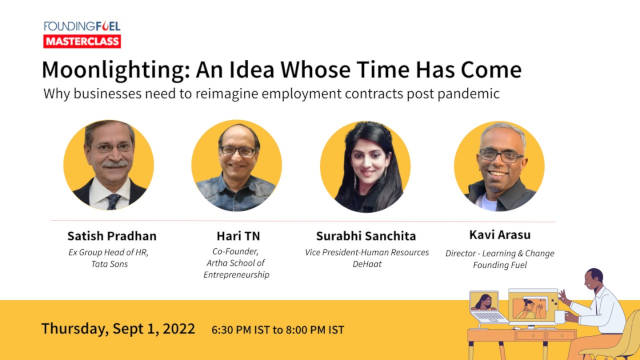[From Pixabay]
Satish Pradhan, Sanchita Surabhi and Kavi Arasu will join TN Hari in a special Founding Fuel Masterclass at 6:30 PM IST on Thursday, September 1.
The pandemic-induced model of hybrid-working has divided employers into two camps.
Rishad Premji’s recent tweet, “There is a lot of chatter about people moonlighting in the tech industry. This is cheating – plain and simple”, has sparked a big debate. This thought is in sharp contrast to Swiggy’s announcement that they don’t care what their employees do in their spare time as long as there is no direct conflict of interest with Swiggy’s business (demystified, this simply means as long as they are not writing code for Zomato or Dunzo in their spare time, Swiggy would be fine with it).
To decode what Premji is trying to say, it would be helpful to understand where this thinking is coming from. IT Services companies in India have long been used to billing their clients for the ‘time’ spent by employees on their accounts. ‘Time and materials’ contracts have been their Holy Grail. These contracts are very difficult to monitor or enforce in true spirit and can be misused by service providers. It has not been uncommon for services companies to bill their employees to multiple clients or use part of their time on activities unrelated to their clients’ interests. Because of rampant misuse, the underlying relationship is based on distrust, and clients have gone to extraordinary lengths to create mechanisms that prevent abuse.
Let’s now take this a step further. When a client pays a services provider, like say Wipro, for 8 hours of an employee’s time, is it fair for Wipro to prevent that employee from doing what she wishes to do beyond the 8 hours? Even in outcome-based contracts, is it fair for a company to say that their employees are not allowed to do what they want to do in their spare time? Even after returning home from work, is an employee not allowed to indulge in her passion for painting and putting up her paintings for sale at an art gallery? Will Wipro determine what she does over the weekend and in her time-off? Does this constitute moonlighting?
The common argument that an ‘employee has voluntarily signed up for these terms’ just does not cut ice. Without taking the cover of an unfairly drafted employment contract, can a company come out and say that what their employees do during their spare time is a violation of a contract? And then expect that employees will continue to give their best and not consider forming employee unions?
In complete contrast, Swiggy has taken a stand that what their employees do during their spare time is none of Swiggy’s business. The reason is not very difficult to understand. Unlike Wipro, Swiggy’s success does not depend upon buying and selling the time of their people. Swiggy’s success depends upon their employees being at their creative best. The quality of outcomes they deliver, drives Swiggy’s success rather than having a sole right on their time. Only if an employee is allowed to indulge her passion in her free time will she be able to give her best to the company. If you come from a background of distrust where what is being bought and sold is literally the time of your employees, you are unlikely to get this. Even manufacturing companies in yesteryears, that went and hired blue-collar hands for menial work, for a fixed number of hours, did not dictate what these blue-collar workers did in their spare time.
And it’s not just this. Some of these services companies also have long notice periods (like 3 months) in employment contracts that are disproportionate to the responsibilities of employees. Notice periods need to be reasonable. Insisting on employees serving these unreasonable notice periods irrespective of whether they make sense or not just to spite them or make it difficult for rivals to recruit them is a violation of the idea of a free labour market.
And by doing this, these companies are making it impossible for startups to hire people. It is quite shocking to see some of these companies, that themselves were startups some decades back and emptied talent from traditional companies, introduce unfair restrictions on their employees to hold them by force and without any remorse.
I think we are reaching the end game on the debate about hybrid-working and moonlighting. Companies that take a restrictive approach that is suffocating for their employees will find it difficult to attract talent, plain and simple.
Join us on September 1



